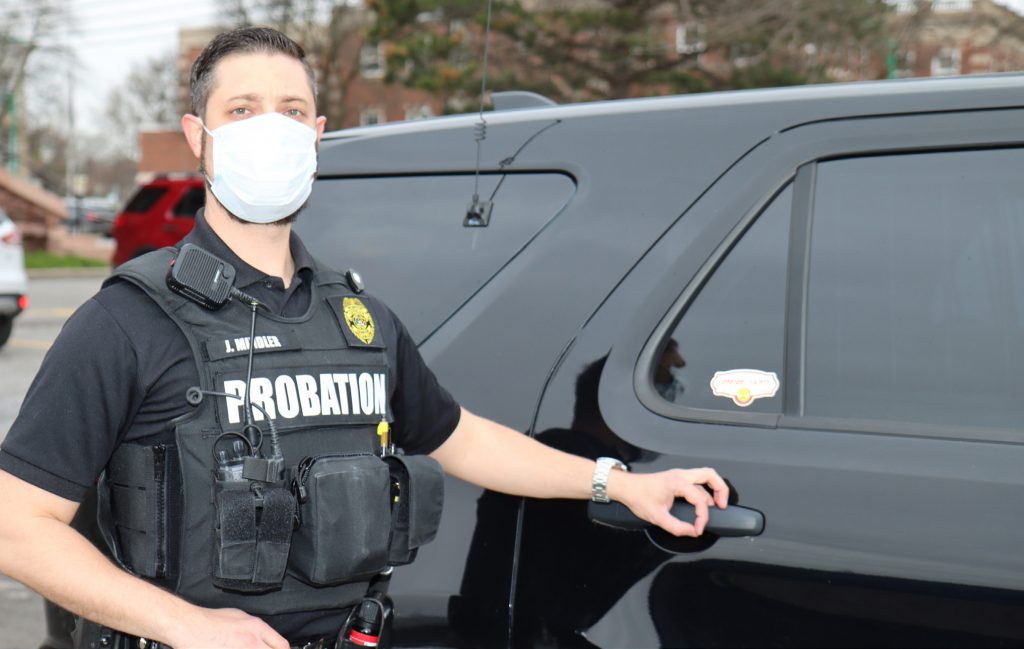CSEA members who work in local government probation departments have seen many changes to their responsibilities, including an increased shift to law enforcement work, heavier caseloads and more risk of violence.
But one thing hasn’t changed — probation workers are providing essential public services, including keeping the public safe and helping offenders rehabilitate, even during the COVID-19 pandemic.
“I think a lot of people either have a misunderstanding of what probation does or some people have no clue what we do,” said Megan Woodward, a CSEA member and Jefferson County Probation Officer. “It’s nice to shine a light that there are other avenues the judicial system tries to take and there are a lot of hands and minds working to assist people behind the scenes that people might not know about.”
Ulster County Local President and CSEA Statewide Probation Committee Chair Todd Schmidt said probation officers have had to constantly adapt to changes in the profession. Probation officers have taken on many added duties and had to adhere to new laws at the same time that counties have been burdened with extra costs due to reduced state aid. Schmidt estimated that state reimbursement has gone from 50 percent to roughly 11 percent.
“Over the last 10 years, we’ve added DNA collection, sex offender registration, and the implementation of the Raise the Age law,” said Schmidt. “All of those things have had significant impacts. For some things, we’ve been able to get money from the state, but it’s not necessarily permanent. With Leandra’s Law, which added ignition devices to cars, we had only temporary funding.”
CSEA has worked to ensure that our county probation departments have the resources needed to meet these new requirements, including $550 million for counties and New York City to support the implementation of “Raise the Age,” and another $160 million in capital funding.
This funding is all at risk unless the state secures sufficient unrestricted federal aid to allow local governments to continue to provide these essential services. With increased responsibilities and high caseloads in many counties, probation workers are concerned.
“As a probation officer, we work to keep the community safe,” said Schoharie County Local President Rick Cain, a probation officer. “Already in my department, we have had two people laid off and we have seen 90 layoffs in the rest of the county departments.”
Changed duties
Over the years, the nature of probation careers has changed from more of a caseworker role to law enforcement, with most workers having peace officer status in New York State. Many county probation officers supervise a wide range of criminal offenses, including DWI cases, illegal gun possession, drug related arrests, grand larceny and domestic abuse cases.
“I think we cover some of the holes that may be in the system to the best we can,” Woodward said. “We are considered law enforcement, but we’re not police officers. We are considered a social worker to an extent but we don’t do direct counseling. But we have entities of all those things mixed into our position.”
“When I first started, we had limited tools to protect us on the job, including firearms, tasers, and pepper spray,” Schmidt said. “Today, we have all those things. We do arrests and extraditions. I’ve been to different parts of the country returning probationers that have absconded.”
“Our job can be a thankless and a dangerous one, and it’s for that reason Genesee County probation officers come armed in most situations,” said Jason Mindler, a county probation officer since 2008. “There is never a routine contact. We rely on well-researched background knowledge of the offender and extensive training to ensure the best possible outcomes when working day to day. Our safety is paramount and is always a top priority for us.”
Adjusting to pandemic
COVID-19 has changed the way probation officers carry out their duties, but they’re still getting the job done.
When he came on board as an Ulster County probation officer 30 years ago, Schmidt didn’t envision a day when he’d be carrying out his role as a court liaison by sitting at a computer and logging onto the internet for a virtual court appearance.
“Due to COVID-19, we’re not seeing people face-to-face,” said Schmidt. “There’s no personal contact, with some exceptions for high risk cases and warrants. We’re using email, Skype, Zoom, and other technology to get the job done.”
Many probation workers are seeing procedure changes such as limiting in-person home visits, web reporting programs that allow location detection via GPS, staff rotating schedules to alternate reporting to the worksite and working remotely and using personal protective equipment.
Woodward said that in addition to these measures, her department is also relying more on phone interviews. “There’s so much you can tell from a person meeting with them face-to-face, it’s different talking to them over the phone,” she said. “You really have to rely on asking them the best questions for the different scenarios and hoping that you get the answers you need.”
Cain said probation workers in Schoharie County are meeting people outside their homes or in parking lots that allow social distancing
“Drug tests are happening in the parking lot using a porta-potty for urine samples,” Cain said.
However, there are some cases in which personal contact is unavoidable.
“We have electronic monitoring, so we have to put ankle bracelets on people for various crimes,” Nassau County Probation Officer Bryan White said. “We have people who are putting these anklets on probationers and maintaining those monitors, which means you are in very close physical contact with the probationers.
The anklets are sanitized once they are taken off of the person.”
Pandemic’s impact on offenders
Probation officers worry about the impact of its ongoing effects, including the fact that many offenders have been disproportionately affected by COVID-19 related closures, layoffs and furloughs.
‘This pandemic has added many complications for probation officers to continue to effectively supervise,” said CSEA Capital Region President Ron Briggs, who serves as the officer liaison on our union’s Probation Committee. “Many people on probation have lost their job, which leaves a void of time that needs to be filled, not to mention the financial hardship. Some [offenders]may be sheltering in locations that aren’t in their best interest. Through it all, officers stand ready to guide and direct probationers so they can be productive members of society.”
“People are drinking a lot more alcohol since the pandemic began, so it’s difficult to get probationers to change that behavior,” White said. “People are also at home a lot more with their spouses, so it increases the likelihood of an altercation while under the influence of drugs or alcohol. That aspect has made our jobs more difficult.”
Mindler said stressors like unemployment and boredom can push drug offenders to violate their probation, endangering their safety and the well-being of others.
“It’s reasonable to assume probationers are struggling and it’s going to be a difficult time for many,” he said.
“Our jobs have certainly evolved over the past few years. We are becoming more visible in the community as more and more offenders are being sentenced to community supervision instead of incarceration.”
Dedication stays strong
Even with many changes and an unprecedented pandemic, probation workers are dedicated to helping offenders improve their lives.
“The first and foremost thing is to make positive change with individuals on probation and to rehabilitate,” Schmidt said. “That may mean drug and alcohol counseling, mental health assistance, or job training. As long as people aren’t a public safety risk or totally non-compliant with the conditions set by the court, our goal is to help them make that positive change.”
“When you have an opportunity to really change someone’s life for the better, an offender who is willing to put in as much work as we do, then it’s all worth it,” Mindler said. “Our reward comes when we see the system work.”
Woodward is also dedicated to steering offenders in the right direction.
“We all went into this field as a way to help people and get people to stand up for themselves and show they just because you came from a family with a criminal influence, you don’t have to follow that line,” she said. “We do our best to show them what their true potential is and how to meet it.”
— Jessica Ladlee, Ove Overmyer, Wendi Bowie, Therese Assalian and Nicholas Newcomb
Top photo: Susan Ploharczyk, an Orange County probation officer, is shown on the job in 2019.
“Probation is important because there is a reason people offend. As a probation officer, I can offer
guidance and programs to facilitate change in their behaviors,” she said. “In addition, we hold them
accountable for any financial obligations they owe to victims, in part making the victims whole.”







